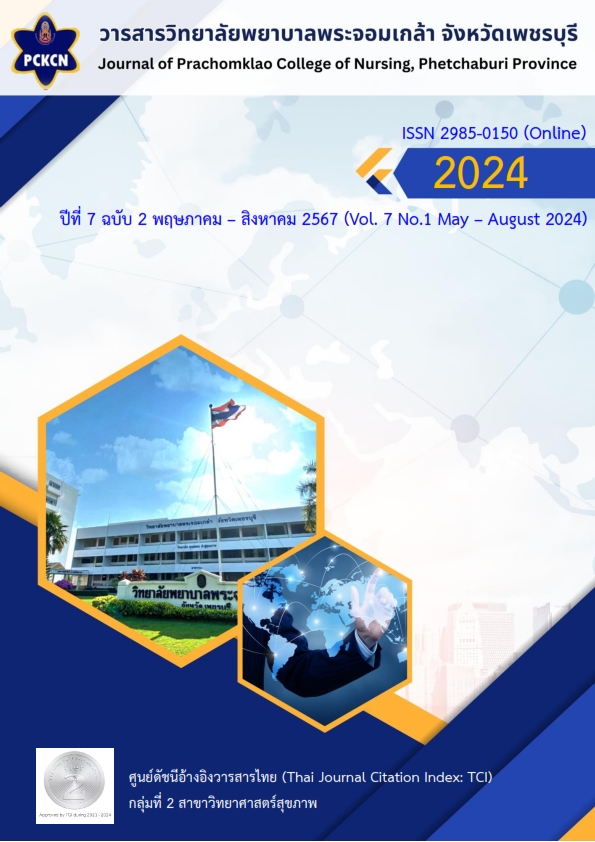ผลของโปรแกรมส่งเสริมความรอบรู้ด้านสุขภาพด้วยแอปพลิเคชันไลน์ต่อพฤติกรรม การป้องกันการเจ็บครรภ์คลอดก่อนกำหนดในสตรีตั้งครรภ์แรก
Main Article Content
บทคัดย่อ
การวิจัยกึ่งทดลอง แบบสองกลุ่มวัดก่อนและหลังทดลอง มีวัตถุประสงค์เพื่อศึกษาประสิทธิผลของโปรแกรมส่งเสริมความรอบรู้ด้านสุขภาพด้วยแอปพลิเคชันไลน์ต่อพฤติกรรมการป้องกันการเจ็บครรภ์คลอดก่อนกำหนด กลุ่มตัวอย่างคือ สตรีตั้งครรภ์แรก อายุครรภ์ 24-34 สัปดาห์ จำนวน 50 คน แบ่งเป็นกลุ่มทดลองได้รับโปรแกรมส่งเสริมความรอบรู้ด้านสุขภาพด้วยแอปพลิเคชันไลน์ จำนวน 25 คน และกลุ่มควบคุม จำนวน 25 คน เก็บรวบรวมข้อมูลด้วยแบบสอบถามพฤติกรรมการป้องกันการเจ็บครรภ์คลอดก่อนกำหนด มีค่าความความตรงเชิงเนื้อหา เท่ากับ .97 และมีค่าความเชื่อมั่นสัมประสิทธิ์แอลฟาของครอนบาค เท่ากับ .77 วิเคราะห์ข้อมูลด้วยสถิติเชิงพรรณนาและการทดสอบที
ผลการวิจัยพบว่า กลุ่มทดลองมีค่าเฉลี่ยพฤติกรรมการป้องกันการเจ็บครรภ์คลอดก่อนกำหนด สูงกว่ากลุ่มควบคุม และสูงกว่ากลุ่มควบคุม อย่างมีนัยสำคัญทางสถิติ ที่ระดับ .05 (t = 3.05, 2.99; p < .01)
ผลการวิจัยชี้ให้เห็นว่า โปรแกรมส่งเสริมความรอบรู้ด้านสุขภาพด้วยแอปพลิเคชันไลน์ ช่วยส่งเสริมพฤติกรรมการป้องกันการเจ็บครรภ์คลอดก่อนกำหนด สามารถนำไปใช้เพื่อลดอัตราการคลอดก่อนกำหนดได้
Downloads
Article Details

อนุญาตภายใต้เงื่อนไข Creative Commons Attribution-NonCommercial-NoDerivatives 4.0 International License.
เนื้อหาและข้อมูลที่เผยแพร่ในวารสารวิทยาลัยพยาบาลพระจอมเกล้า จังหวัดเพชรบุรี ถือเป็นข้อคิดเห็นและความรับผิดชอบของผู้นิพนธ์บทความโดยตรง บทความ เนื้อหา ข้อมูล รูปภาพ ฯลฯ ที่ได้รับการเผยแพร่ในวารสารนี้ ถือเป็นลิขสิทธิ์ของวารสารฯ หากบุคคลหรือหน่วยงานใดต้องการนำทั้งหมดหรือส่วนหนึ่งส่วนใดไปเผยแพร่หรือเพื่อกระทำการใด ๆ จะต้องอ้างอิงวิทยาลัยพยาบาลพระจอมเกล้า จังหวัดเพชรบุรี ทุกครั้ง
เอกสารอ้างอิง
Aljassim, N., & Ostini, R. (2020). Health literacy in rural and urban populations: A systematic review. Patient education and counseling, 103(10), 2142–2154. https://doi.org/10.1016/j.pec.2020.06.007
Bloom, B. S. (1971). Handbook on formative and summative evaluation of student learning. McGraw–Hill.
Cha-Am Hospital, Phetchaburi Province. (2024). Preterm labor without delivery statistics 2021-2023. Cha-Am Hospital, Phetchaburi Province.
Corchero-Falcón, M. D. R., Gómez-Salgado, J., García-Iglesias, J. J., Camacho-Vega, J. C., Corchero-Falcon, M. D. R., Gomez-Salgado, J., Garcia-Iglesias, J. J., Camacho-Vega, J. C., Fagundo-Rivera, J., & Carrasco-Gonzalez, A. M. (2023). Risk factors for working pregnant women and potential adverse consequences of exposure: A systematic review. International Journal of Public Health, 68, Article 1605655. https://doi.org/10.3389/ijph.2023.1605655
Cunningham, F. G., Leveno, K. J., Bloom, S. L., Dashe, S. J., Hoffman, B. L., Casey, B. M., & Spong, C. Y. (2018). Williams obstetrics (25th ed.). McGraw-Hill.
Faul, F., Erdfelder, E., Lang, A. G., & Buchner, A. (2007) G*Power 3: A flexible statistical power analysis program for the social, behavioral, and biomedical sciences. Behavior Research Methods, 39, 175-191. http://dx.doi.org/10.3758/BF03193146
Gete, D. G., Waller, M., & Mishra, G. D. (2020). Prepregnancy dietary patterns and risk of preterm birth and low birth weight: Findings from the Australian longitudinal study on women’s health. The American Journal of Clinical Nutrition, 111(5), 1048-1058. https://doi.org/10.1093/ajcn/nqaa057
Hfocus. (2023, 17 November). The Department of Health revealed information on premature birth, recommending early prenatal care to reduce the risk of baby death. https://www.hfocus.org/content/2023/11/28969
Kaewnguen, N., Visudhtibhan, P. J., & Visudhtibhan, A. (2022). Effects of an epilepsy control program via the LIINE application on health literacy and health behavior in patients with epilepsy. Nursing Research and Innovation Journal, 28(1), 109–126. (in Thai)
Kelly, K., Marie, S., & John, D. (2013). Environmental contaminant exposures and preterm birth: A comprehensive review. Journal of Toxicology and Environmental Health, 16(2), 69-113. https://doi.org/10.1080/10937404.2013.775048
Lilliecreutz, C., Larén, J., Sydsjö, G., & Josefsson, A. (2016). Effect of maternal stress during pregnancy on the risk for preterm birth. BMC Pregnancy and Childbirth, 16, Article 5. https://doi.org/10.1186/s12884-015-0775-x
Siriviboonlit, M. (2023). The development of a model for building health literacy skills in preventing preterm birth of pregnant women receiving antenatal services, King Narai Maharaj Hospital. Journal of Health and Environmental Education, 8(2), 371-382. (in Thai)
Meldgaard, M., Jensen, A. L., Johansen, A. D., Maimburg, R. D., & Maindal, H. T. (2022). Health literacy and behaviour among pregnant women with obesity: A qualitative interpretive description study. BMC Pregnancy and Childbirth, 22, Article 712. https://doi.org/10.21203/rs.3.rs-902710/v1
Mitha, A., Chen, R., Razaz, N., Johansson, S., Stephansson, O., Altman, M., & Bolk, J. (2024). Neurological development in children born moderately or late preterm: National cohort study. BMJ, 384, Article 075630. https://doi.org/10.1136/bmj-2023-075630
Nawabi, F., Krebs, F., Vennedey, V., Shukri, A., Lorenz, L., & Stock, S. (2021). Health literacy in pregnant women: A systematic review. International Journal of Environmental Research and Public Health, 18(7), Article 3847. https://doi.org/10.3390/ijerph18073847
Nutbeam, D. (2008). The evolving concept of health literacy. Social Science & Medicine, 67(12), 2072-2078. https://doi.org/10.1016/j.socscimed.2008.09.050
Okun, M. L., Schetter, C. D., & Glynn, L. M. (2011). Poor sleep quality is associated with preterm birth. Sleep, 34(11), 1493-1498. https://doi.org/10.5665/sleep.1384
Palmer, K. T., Bonzini, M., Harris, E. C., Linaker, C., & Bonde, J. P. (2013). Work activities and risk of prematurity, low birth weight and pre-eclampsia: An updated review with meta-analysis. Occupational and Environmental Medicine, 70(4), 213-222. https://doi.org/10.1136/oemed-2012-101032
Putcharoen, M., Siriarunrat, S., & Supasri, P. (2023). The Effect of empowerment program using the LINE application on health behaviors and recurrence of preterm labor in women with preterm labor. The Journal of Faculty of Nursing Burapha University, 31(3), 1-12. (in Thai)
Rang, N. N., Hien, T. Q., Chanh, T. Q., & Thuyen, T. K. (2020). Preterm birth and secondhand smoking during pregnancy: A case-control study from Vietnam. PLOS ONE, 15(10), Article 0240289. https://doi.org/10.1371/journal.pone.0240289
Rea, S., Zynda, A., Allison, B., & Tolleson-Rinehart, S. (2022). Adolescent perceptions of technology-based sexual and reproductive health services: A systematic review. Journal of Adolescent Health, 71(5), 533-544. https://doi.org/10.1016/j.jadohealth.2022.05.012
Sbrana, M., Grandi, C., Brazan, M., Junquera, N., Nascimento, M. S., Barbieri, M. A., Bettiol, H., & Cardoso, V. C. (2016). Alcohol consumption during pregnancy and perinatal results: A cohort study. Sao Paulo Medical Journal, 134(2), 146-152. https://doi.org/10.1590/1516-3180.2015.02040211
Stylianou-Riga, P., Kouis, P., Kinni, P., Rigas, A., Papadouri, T., Yiallouros, P. K., & Theodorou, M. (2018). Maternal socioeconomic factors and the risk of premature birth and low birth weight in Cyprus: A case–control study. Reproductive Health, 15, Article 157. https://doi.org/10.1186/s12978-018-0603-7
Techasaksri, T., Siriarunrat, P., Supasri, P., Supaseemanon, W., Boonnetr, N., & Kwannetr, C. (2017). A Causal Model of Quality of Life in Pregnant Women. The Southern College Network Journal of Nursing and Public Health, 4(1), 28-46. (in Thai)
Thato, R. (2018). Nursing research: Concepts to application (4th ed.). Chulalongkorn University Press. (in Thai)
Toontham, K., & Supathaweewat, S. (2023). Factors associated with preterm birth, accuracy rate and coverage rate of the clinical guideline of preterm labor and success rate in preterm uterine contraction inhibition in Mahasarakham Hospital. Mahasarakham Hospital Journal, 20(2), 75-88. (in Thai)
World Health Organization: WHO. (2023). Preterm birth. https://www.who.int/news-room/fact-sheets/detail/preterm-birth


